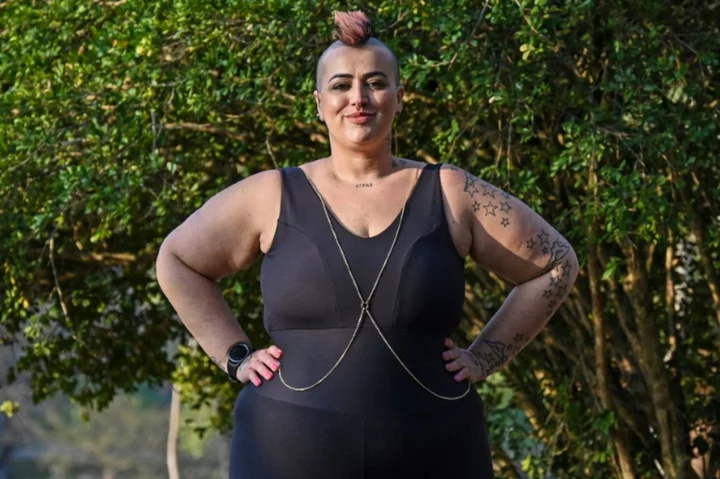Defying the fashion world's narrow stereotype of beauty, Brazilian plus-size designer Amanda Momente poses confidently for the camera, wearing the clothing label she founded after failing to find other options that fit.
More than half of all adults in Brazil are overweight, but Momente is part of a growing movement of entrepreneurs, activists and models who are fed up with a fashion industry they say fails to fit their needs and shames them for their bodies.
"Society judged me based on one thing, so I took that thing and used it... to launch my business," says Momente, 34, dressed in a sheer black bodysuit created by Wondersize, the company she founded in 2017.
The former real-estate agent, who sports a pink mohawk and multiple tattoos, got the idea after feeling uncomfortable at the gym in clothes she says were too tight, turned transparent when stretched or bunched up around her thighs.
She decided to find a seamstress to help her make her own workout outfit.
It turned out so well she quit her day job and plunged headfirst into the fashion world, she says.
The rise of colorful, stylish clothes for Brazilians with large bodies is part of a broader international trend rejecting unrealistic standards of beauty, especially for women.
"The fashion industry needs to fit our bodies, not the other way around," says Momente.
- 'Identity and dignity' -
Major brands tend to dedicate at most a small portion of their lines to clothing in larger sizes, leaving "repressed" demand, says Marcela Liz, head of the Brazil Plus Size Association.
The plus-size sector grew in Brazil more than 75 percent in the decade through 2021, reaching sales of 9.6 billion reais (about $1.9 billion) that year, according to the association.
It projects sales will hit 15 billion reais by 2027 in Latin America's biggest economy.
"Supply has improved, but we're still not meeting demand," says Liz.
The nascent industry sashayed through Sao Paulo this month at the Pop Plus fair, where indie designers showed off sparkling skirts, racy tops, T-shirts stamped with bold statements and other clothes in sizes ranging up to 70.
"The market saw fat people as people who didn't like fashion, who just wanted to hide their bodies," says Flavia Durante, the activist who founded the fair in 2012.
"We had clothes, not fashion," she told AFP.
"Fashion isn't just about consumption. It's about identity and dignity."
- More work to do -
TV presenter and plus-size model Letticia Munniz has strutted the runway at glitzy Sao Paulo fashion week, made the cover of glossy magazines and been the face of numerous ad campaigns.
But she says real inclusion remains a long way off for the overweight and obese in Brazil -- 57 percent and 23 percent of the adult population, respectively, in the country of 203 million people.
"Things have improved, but our work is still seen as just checking a quota box. We're not seen as real equals," she says.
The activist and influencer, who usually wears custom-made clothes, says she is glad to see more plus sizes on runways -- but adds that doesn't necessarily mean they are actually available in stores.
She encourages her more than one million followers on social media to love themselves as they are.
"When you find something made to exalt your body instead of hide it, it changes everything," she says in one post.
mls/jhb/md/dw

